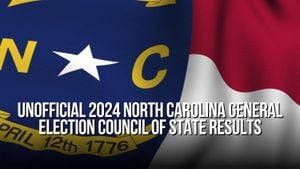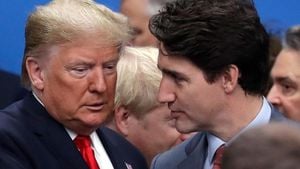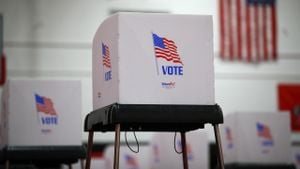After years of dramatic shifts in political tides, Donald Trump has captured the presidency once more, shaking the waters of American politics and exciting various sectors, including the tech world. Trump's latest victory has drawn immediate reactions from tech leaders, many of whom had previously expressed discontent with the former president yet now appear eager to reforge their relationships with the White House.
Among the first to congratulate Trump was Jeff Bezos, the billionaire founder of Amazon and owner of The Washington Post. Via social media, Bezos delivered a message packed with both enthusiasm and optimism, stating, "Big congratulations to our 45th and now 47th President on an extraordinary political comeback and decisive victory. No nation has bigger opportunities. Wishing @realDonaldTrump all success in leading and uniting the America we all love." This congratulatory tone seemed to dispel any doubts about Bezos's stance after he had previously blocked The Washington Post from endorsing any candidate for the 2024 election, something which stirred considerable controversy.
Zuckerberg, the CEO of Meta who infamously banned Trump from Facebook following the January 6 riots, also weighed in. He expressed eagerness to collaborate with Trump, noting, "We have great opportunities ahead of us as a country. Looking forward to working with you and your administration," on his Threads account. The irony of this statement wasn’t lost on observers, considering the way the social media platform has navigated political events over the past few years.
Further affirming tech's newfound enthusiasm for Trump was Sundar Pichai, the Chief Executive Officer of Google, who said, "We are in a golden age of American innovation and are committed to working with his administration to help bring the benefits to everyone." Pichai's message implies not just positivity for Trump's victory but suggests Google is preparing for the potential outcomes of his administration, including scrutiny on antitrust issues looming over the company.
Tim Cook, the CEO of Apple, joined the chorus with his congratulations, remarking, "Congratulations President Trump on your victory! We look forward to engaging with you and your administration to help make sure the United States continues to lead with and be fueled by ingenuity, innovation, and creativity." Cook's words highlight how the tech giants are rallying behind Trump now, ready to push forward with policy agendas they hope will benefit their companies.
The reception from the tech industry is noteworthy when compared to 2016, where Bezos articulated caution and concerns about Trump's policies. Back then, he had pledged to keep open communication, but he instead faced sharp exchanges throughout Trump's campaign. This time, the tone seems markedly different, signaling a palpable shift from skepticism to eagerness to work with the new administration.
It's evident many tech leaders still recall the interactions they had with Trump back during his first tenure. Amazon found itself embroiled in legal struggles with Trump's administration over government contracts, yet the business community seems willing to set aside past conflicts for the promise of fruitful cooperation. Many are pointing to the previous tax cuts and deregulation during the Trump presidency as factors examining their stance.
Years of contentious exchanges, particularly surrounding issues like immigration and labor, could threaten relationships moving forward. Ryan Calo from the University of Washington warned, "While Trump policies could benefit Big Tech’s bottom line, a crackdown on immigration could make it more difficult to recruit and retain international talent." This is significant considering Amazon had led the way with H-1B visa holders within its workforce.
Despite the warm greetings and optimistic outlook from tech giants, critics like Calo fear the industry's continued partnership with Trump could exacerbate challenges. When tech leaders communicate their intentions, they often do so balancing admiration for potential collaboration with skepticism about the broader impact of those policies on the workforce.
Bezos had recently faced backlash for his decision to halt the newspaper's endorsement policy, citing the need to regain trust from the American public. Despite previous jabs, this strategy aims to pivot Amazon and The Washington Post back to focusing on trustworthiness. Bezos's editorial aimed to distinguish between personal perspectives and media responsibilities, asserting it wasn’t about influencing election outcomes.
The enormous stakes involved with presidential endorsements and alliances with Trump are symbolically akin to leaders standing before the king. And with Trump now set for another term, tech executives appear to be preparing for another dance on the political stage, hoping to both navigate and benefit from the new terrain. The question remains, can they maintain influence over policy without sacrificing their principles, or will they be forced to operate as merely sycophants?
The growing chorus of support has extended from technology to finance, as big bank executives have similarly voiced their congratulations and readiness to work with the incoming administration. David Solomon, Goldman Sachs CEO, expressed enthusiasm: “I congratulate President Trump and we look forward to working with the new administration to support sound policies.” Jamie Dimon from JPMorgan Chase echoed this sentiment, approaching the relationship as one of mutual benefit to drive stability and growth for the economy.
Even though there is palpable excitement among these business leaders, the response from some quarters of the public remains apprehensive. Many are concerned about how Trump’s reelected presidency may impact regulatory oversight, fair competition, and the social fabric of American society. For them, it’s unclear whether the wins within industries will result in benefits trickling down to everyday Americans.
While some observers suggest the tech industry may enjoy favorable policies under Trump, they caution vigilance, noting the key challenge will be balancing those corporate interests with broader social responsibility. Tech leaders must navigate this new relationship with care, as past grievances could quickly ripple back should policies turn detrimental to the workforce they rely on.
Overall, the narrative developing within the tech sector reveals both calculated optimism and strategic caution. Business leaders are stepping forward to express their congratulations as they prepare to engage actively with Trump's administration. Whether they will be able to forge effective partnerships without compromising their principles remains to be seen. The next few years will be telling for both industry leaders and the broader American populace as they observe how these relationships shape the future of policy and society.



